|
|
|
Sort Order |
|
|
|
Items / Page
|
|
|
|
|
|
|
| Srl | Item |
| 1 |
ID:
188900


|
|
|
|
|
| Summary/Abstract |
During the 2021 mass protests in Colombia, and while international calls for the Colombian government to respect human rights were intensifying, Canada’s position remained somewhat ambiguous. Part of Canada’s ambiguity can be explained by a simplistic characterization of Colombia as a “weak state.” This article assesses Canada’s bilateral relationship by historizing the development of Colombia’s governance in the key overlapping sectors of security, human rights, and natural resources. From extensive fieldwork, we distinguish two competing rationalities based on the articulation of the notions of “conflict” and “dissent” with the notion of the “rule of law.” We believe that Canada’s bilateral relation with Colombia in the last decades has overlooked the contradictions that exist between democratizing rationalities and antipolitical rationalities. As a result, Canada’s foreign policy has been based on an overly simplistic conception of the relationship between development, security, and the rule of law.
|
|
|
|
|
|
|
|
|
|
|
|
|
|
|
|
| 2 |
ID:
188910
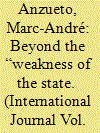

|
|
|
|
|
| Summary/Abstract |
During the 2021 mass protests in Colombia, and while international calls for the Colombian government to respect human rights were intensifying, Canada’s position remained somewhat ambiguous. Part of Canada’s ambiguity can be explained by a simplistic characterization of Colombia as a “weak state.” This article assesses Canada’s bilateral relationship by historizing the development of Colombia’s governance in the key overlapping sectors of security, human rights, and natural resources. From extensive fieldwork, we distinguish two competing rationalities based on the articulation of the notions of “conflict” and “dissent” with the notion of the “rule of law.” We believe that Canada’s bilateral relation with Colombia in the last decades has overlooked the contradictions that exist between democratizing rationalities and antipolitical rationalities. As a result, Canada’s foreign policy has been based on an overly simplistic conception of the relationship between development, security, and the rule of law.
|
|
|
|
|
|
|
|
|
|
|
|
|
|
|
|
| 3 |
ID:
188906
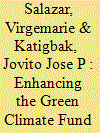

|
|
|
|
|
| Summary/Abstract |
The prevailing issues in the Green Climate Fund on implementation and governance can be seen as symptoms of the ills of the international climate finance architecture. These are compounded by the inadequate financial support provided by developed countries to developing countries and the low volume of funding channelled to adaptation projects. Evidently, the cited issues highlight the need to fully integrate the principles of justice and equity into the global climate change regime. Thus, this policy brief discusses the key challenges related to climate finance, and outlines several options and considerations on improving the Green Climate Fund operations using a climate justice lens. This paper intends to take a more normative and ethical discussion on the topic of climate finance.
|
|
|
|
|
|
|
|
|
|
|
|
|
|
|
|
| 4 |
ID:
188916
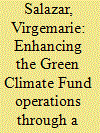

|
|
|
|
|
| Summary/Abstract |
The prevailing issues in the Green Climate Fund on implementation and governance can be seen as symptoms of the ills of the international climate finance architecture. These are compounded by the inadequate financial support provided by developed countries to developing countries and the low volume of funding channelled to adaptation projects. Evidently, the cited issues highlight the need to fully integrate the principles of justice and equity into the global climate change regime. Thus, this policy brief discusses the key challenges related to climate finance, and outlines several options and considerations on improving the Green Climate Fund operations using a climate justice lens. This paper intends to take a more normative and ethical discussion on the topic of climate finance.
|
|
|
|
|
|
|
|
|
|
|
|
|
|
|
|
| 5 |
ID:
188907
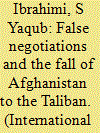

|
|
|
|
|
| Summary/Abstract |
This paper examines the dark side of Afghanistan’s peace negotiations that started under Donald Trump’s South Asia policy in Doha, Qatar, in September 2018 and ended, without a meaningful success, in December 2020. The paper examines both the United States–Taliban and the intra-Afghan negotiations and discusses the impact of the false negotiation behaviour by the Taliban and the Afghan government on the peace talks. It also explains how, in the absence of conditions for a political settlement, parties to the conflict acted as false negotiators, which resulted in the failure of efforts to launch a genuine peace process and in the Taliban’s military domination of Afghanistan.
|
|
|
|
|
|
|
|
|
|
|
|
|
|
|
|
| 6 |
ID:
188897
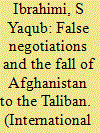

|
|
|
|
|
| Summary/Abstract |
This paper examines the dark side of Afghanistan’s peace negotiations that started under Donald Trump’s South Asia policy in Doha, Qatar, in September 2018 and ended, without a meaningful success, in December 2020. The paper examines both the United States–Taliban and the intra-Afghan negotiations and discusses the impact of the false negotiation behaviour by the Taliban and the Afghan government on the peace talks. It also explains how, in the absence of conditions for a political settlement, parties to the conflict acted as false negotiators, which resulted in the failure of efforts to launch a genuine peace process and in the Taliban’s military domination of Afghanistan.
|
|
|
|
|
|
|
|
|
|
|
|
|
|
|
|
| 7 |
ID:
188904


|
|
|
|
|
| Summary/Abstract |
The Synthetic Environment (SE) takes the power of computing, digital processing, artificial intelligence, extended reality technology, and other advancements borrowed from the gaming industry to create a computer simulation with near-perfect levels of realism. Designed to enable connectivity across all domains and platforms, SE has the potential to dramatically improve military training, force development, situational awareness, and communications. Our article provides a technical overview of SE and offers a high-level analysis of its use in Canada, the US, UK, and Australia. Informed by dozens of interviews and a roundtable workshop held with experts from academia, industry, and government, this article relates SE to Canada’s future defence policy. We argue that leveraging SE effectively will require that Canada commit to a long-term SE program, promote new government-industry partnerships, encourage top-down leadership from both civilian and military officials, and consolidate domestic skillsets and industry knowhow to maintain and retain Canadian sovereignty.
|
|
|
|
|
|
|
|
|
|
|
|
|
|
|
|
| 8 |
ID:
188914


|
|
|
|
|
| Summary/Abstract |
The Synthetic Environment (SE) takes the power of computing, digital processing, artificial intelligence, extended reality technology, and other advancements borrowed from the gaming industry to create a computer simulation with near-perfect levels of realism. Designed to enable connectivity across all domains and platforms, SE has the potential to dramatically improve military training, force development, situational awareness, and communications. Our article provides a technical overview of SE and offers a high-level analysis of its use in Canada, the US, UK, and Australia. Informed by dozens of interviews and a roundtable workshop held with experts from academia, industry, and government, this article relates SE to Canada’s future defence policy. We argue that leveraging SE effectively will require that Canada commit to a long-term SE program, promote new government-industry partnerships, encourage top-down leadership from both civilian and military officials, and consolidate domestic skillsets and industry knowhow to maintain and retain Canadian sovereignty.
|
|
|
|
|
|
|
|
|
|
|
|
|
|
|
|
| 9 |
ID:
188903


|
|
|
|
|
| Summary/Abstract |
Track Two Diplomacy, a form of facilitated informal and unofficial dialogues between conflicting parties, has become a well-established form of international conflict resolution. This paper seeks to explore whether the techniques and practices of Track Two could be applied in a new setting beyond international armed conflicts: public health. Global society continues to grapple with the devastating effects of the COVID-19 pandemic, systemic racism, and climate change, among other pressing public health issues that can not only exacerbate but also create new conflicts that negatively affect communities. Innovative and interdisciplinary approaches are needed more than ever. We synthesize literature from both Track Two and public health fields to present a conceptual framework that posits whether and how such concepts as the “problem-solving workshop,” “transfer,” “reflective practice” and others might support parties involved in divisive, intractable, visible, and invisible conflicts which currently mark the public health space.
|
|
|
|
|
|
|
|
|
|
|
|
|
|
|
|
| 10 |
ID:
188913
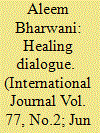

|
|
|
|
|
| Summary/Abstract |
Track Two Diplomacy, a form of facilitated informal and unofficial dialogues between conflicting parties, has become a well-established form of international conflict resolution. This paper seeks to explore whether the techniques and practices of Track Two could be applied in a new setting beyond international armed conflicts: public health. Global society continues to grapple with the devastating effects of the COVID-19 pandemic, systemic racism, and climate change, among other pressing public health issues that can not only exacerbate but also create new conflicts that negatively affect communities. Innovative and interdisciplinary approaches are needed more than ever. We synthesize literature from both Track Two and public health fields to present a conceptual framework that posits whether and how such concepts as the “problem-solving workshop,” “transfer,” “reflective practice” and others might support parties involved in divisive, intractable, visible, and invisible conflicts which currently mark the public health space.
|
|
|
|
|
|
|
|
|
|
|
|
|
|
|
|
| 11 |
ID:
188909
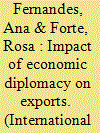

|
|
|
|
|
| Summary/Abstract |
It is widely recognized that exports contribute to economic growth. Many governments have seen economic diplomacy representation (foreign offices, embassies and consulates) as an important tool to diminish export barriers and foster economic growth. Thus, this study aims at understanding to what extent does the presence of Portuguese economic diplomatic representation in foreign states impact Portuguese exports. Based on merchandise exports to 144 countries for the period between 2008 and 2018, and using a quasi-gravity model of trade, results indicate that ceteris paribus, Portugal exports more to countries which host a Portuguese office and an increase in the number of offices in a foreign country positively affects exports to that country.
|
|
|
|
|
|
|
|
|
|
|
|
|
|
|
|
| 12 |
ID:
188899
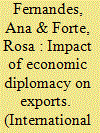

|
|
|
|
|
| Summary/Abstract |
It is widely recognized that exports contribute to economic growth. Many governments have seen economic diplomacy representation (foreign offices, embassies and consulates) as an important tool to diminish export barriers and foster economic growth. Thus, this study aims at understanding to what extent does the presence of Portuguese economic diplomatic representation in foreign states impact Portuguese exports. Based on merchandise exports to 144 countries for the period between 2008 and 2018, and using a quasi-gravity model of trade, results indicate that ceteris paribus, Portugal exports more to countries which host a Portuguese office and an increase in the number of offices in a foreign country positively affects exports to that country.
|
|
|
|
|
|
|
|
|
|
|
|
|
|
|
|
| 13 |
ID:
188905
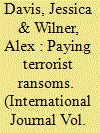

|
|
|
|
|
| Summary/Abstract |
Terrorist groups are believed to be financed, in part, by ransoms paid for kidnap victims. As part of global efforts to counter the financing of terrorism and prevent further terrorist attacks (including more kidnappings), the international community has attempted to implement a moratorium on the payment of ransoms. Despite a unified stance, ransom payments to terrorist groups have continued. An exploratory review of 20 countries reveals significant variation between public statements and private practice when it comes to ransom payments. While it is clear that states, organizations, and individuals are paying terrorist ransoms, it is far less clear what effect this has had on terrorism itself. A review of three case studies shows significant variation in the relationship (or perhaps, lack thereof) between ransom payments and terrorist attacks. These findings suggest a need for more study on the effects of ransom payments on terrorist capabilities, and a re-assessment of existing “no-ransom” policies.
|
|
|
|
|
|
|
|
|
|
|
|
|
|
|
|
| 14 |
ID:
188915
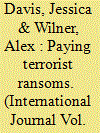

|
|
|
|
|
| Summary/Abstract |
Terrorist groups are believed to be financed, in part, by ransoms paid for kidnap victims. As part of global efforts to counter the financing of terrorism and prevent further terrorist attacks (including more kidnappings), the international community has attempted to implement a moratorium on the payment of ransoms. Despite a unified stance, ransom payments to terrorist groups have continued. An exploratory review of 20 countries reveals significant variation between public statements and private practice when it comes to ransom payments. While it is clear that states, organizations, and individuals are paying terrorist ransoms, it is far less clear what effect this has had on terrorism itself. A review of three case studies shows significant variation in the relationship (or perhaps, lack thereof) between ransom payments and terrorist attacks. These findings suggest a need for more study on the effects of ransom payments on terrorist capabilities, and a re-assessment of existing “no-ransom” policies.
|
|
|
|
|
|
|
|
|
|
|
|
|
|
|
|
| 15 |
ID:
188902


|
|
|
|
|
| Summary/Abstract |
This article explains Turkey’s hard power usage in Syria, Azerbaijan, and Libya. We argue that gaining a respected status forms the basis of Turkish foreign policy and the main cause of Turkey’s hard power usage was the failure of Turkey’s previous status-seeking strategy. Turkey had followed a cooperationist strategy since the early 1990s by pursuing membership in the EU, strengthening ties with the West, and leading regional mediation efforts. However, this strategy failed due to the changing the security environment in the early 2010s and the discord between the interests of West and Turkey. This led Turkey to be more prone to using hard power, through which Turkey could achieve status and influence in multiple regions. This study provides an insight into the status-seeking strategies of Turkey, as an emerging middle power, by unpacking its priorities and contributes to the ongoing debates on Turkey’s foreign policy under Erdoğan.
|
|
|
|
|
|
|
|
|
|
|
|
|
|
|
|
| 16 |
ID:
188912


|
|
|
|
|
| Summary/Abstract |
This article explains Turkey’s hard power usage in Syria, Azerbaijan, and Libya. We argue that gaining a respected status forms the basis of Turkish foreign policy and the main cause of Turkey’s hard power usage was the failure of Turkey’s previous status-seeking strategy. Turkey had followed a cooperationist strategy since the early 1990s by pursuing membership in the EU, strengthening ties with the West, and leading regional mediation efforts. However, this strategy failed due to the changing the security environment in the early 2010s and the discord between the interests of West and Turkey. This led Turkey to be more prone to using hard power, through which Turkey could achieve status and influence in multiple regions. This study provides an insight into the status-seeking strategies of Turkey, as an emerging middle power, by unpacking its priorities and contributes to the ongoing debates on Turkey’s foreign policy under Erdoğan.
|
|
|
|
|
|
|
|
|
|
|
|
|
|
|
|
| 17 |
ID:
188911


|
|
|
|
|
| Summary/Abstract |
This article explores how the BRICS states (Brazil, Russia, India, China, and South Africa) frame the issue of climate change. Based on constructivist insights, the article argues that the formation of collective identity has fundamentally shaped the BRICS framing of climate change. On the one hand, BRICS′ connections to the developing world explain why BRICS has given voice to the arguments of developing countries with respect to climate change. On the other hand, BRICS′ policy concepts, ideas, and discourse reflect the attributes associated with the identity of emerging powers. This article argues that emerging power status encourages the BRICS states to portray themselves as responsible actors on the global scale and conceptualize a climate-sensitive economic development model in contrast to the Western production paradigm that is regarded as unsympathetic towards the needs of developing nations. In this process, the perception of the developed world as the relational other supports the sense of we-ness among the BRICS states, thereby shaping their policy formulations with respect to climate change.
|
|
|
|
|
|
|
|
|
|
|
|
|
|
|
|
| 18 |
ID:
188901


|
|
|
|
|
| Summary/Abstract |
This article explores how the BRICS states (Brazil, Russia, India, China, and South Africa) frame the issue of climate change. Based on constructivist insights, the article argues that the formation of collective identity has fundamentally shaped the BRICS framing of climate change. On the one hand, BRICS′ connections to the developing world explain why BRICS has given voice to the arguments of developing countries with respect to climate change. On the other hand, BRICS′ policy concepts, ideas, and discourse reflect the attributes associated with the identity of emerging powers. This article argues that emerging power status encourages the BRICS states to portray themselves as responsible actors on the global scale and conceptualize a climate-sensitive economic development model in contrast to the Western production paradigm that is regarded as unsympathetic towards the needs of developing nations. In this process, the perception of the developed world as the relational other supports the sense of we-ness among the BRICS states, thereby shaping their policy formulations with respect to climate change.
|
|
|
|
|
|
|
|
|
|
|
|
|
|
|
|
| 19 |
ID:
188898


|
|
|
|
|
| Summary/Abstract |
This article critically examines the use of national border closures at the outset of the COVID-19 pandemic. After explaining why targeted border closures generally do not work and how they violated international law at the time, we examine the unprecedented case of total border closures. Positing that since the current instruments and institutions of global health governance did not anticipate this phenomenon, the legality of total border closures rests on less certain grounds. Then, after asking why nearly every government implemented some form of border closure in March 2020 if neither science nor law provided adequate motivation for their use, we conclude that in the face of a global health emergency, border closures represent an opportunity for political leaders to show determined action, redirect blame to other jurisdictions, and reinforce nationalism. We proceed to argue that both targeted and total border closures have profound legal, epidemiological, and political significance as performances that contradict global realities while undermining notions of global solidarity. Such political theatre means that citizens must weigh these consequences against any perceived benefits of border closures as they would any other politically driven government action, and contest and challenge them appropriately. Citizens must not unduly defer to scientists or lawyers on early COVID-19 border closures because these were primarily political—not scientific or legal—decisions. In this vein, we conclude with some guiding political considerations for scrutinizing government decisions to close borders and observations for the future of global health cooperation during infectious disease outbreaks.
|
|
|
|
|
|
|
|
|
|
|
|
|
|
|
|
| 20 |
ID:
188908


|
|
|
|
|
| Summary/Abstract |
This article critically examines the use of national border closures at the outset of the COVID-19 pandemic. After explaining why targeted border closures generally do not work and how they violated international law at the time, we examine the unprecedented case of total border closures. Positing that since the current instruments and institutions of global health governance did not anticipate this phenomenon, the legality of total border closures rests on less certain grounds. Then, after asking why nearly every government implemented some form of border closure in March 2020 if neither science nor law provided adequate motivation for their use, we conclude that in the face of a global health emergency, border closures represent an opportunity for political leaders to show determined action, redirect blame to other jurisdictions, and reinforce nationalism. We proceed to argue that both targeted and total border closures have profound legal, epidemiological, and political significance as performances that contradict global realities while undermining notions of global solidarity. Such political theatre means that citizens must weigh these consequences against any perceived benefits of border closures as they would any other politically driven government action, and contest and challenge them appropriately. Citizens must not unduly defer to scientists or lawyers on early COVID-19 border closures because these were primarily political—not scientific or legal—decisions. In this vein, we conclude with some guiding political considerations for scrutinizing government decisions to close borders and observations for the future of global health cooperation during infectious disease outbreaks.
|
|
|
|
|
|
|
|
|
|
|
|
|
|
|
|
|
|
|
|
|